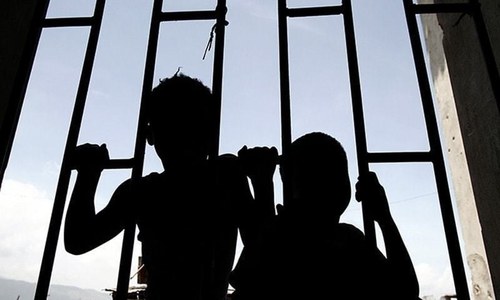ISLAMABAD: The Senate’s special committee established to suggest ways for controlling the increasing cases of child abuse in the country on Monday expressed dismay over what it called the indifferent attitude of religious segments towards the social evil.
A meeting of the Senate Special Committee on Child Protection which was held here in the Parliament House was presided over by its chairperson Rubina Khalid, who gave the ruling that it was essential for the future of the country to control the growing cases of child abuse.
“It is important to know the reasons behind the increase in the cases of child abuse,” she said, adding that the special committee’s members would study the Zainab Alert Bill.
The special committee was formed after a student of a religious seminary was allegedly abused by his teacher in Mansehra district of Khyber Pakhtunkhwa in December last year.
The committee was informed that the seminary where the incident took place was not registered and it was operated privately and that the accused was a brother of its administrator.
Council of Islamic Ideology’s role sought for legislation
The committee noted that special courts for child protection had already been established in several cities of KP.
Senator Samina Saeed said that harsh sentences should be awarded to elements involved in such crimes.
Senator Javed Abbasi said laws for protection of children should be reviewed.
The committee chairperson lauded the role of media and civil society for highlighting such cases, saying their efforts have resulted in improved public awareness about the issue which is still considered a taboo.
She informed the meeting about her discussion on the issue with the chairman of the Council of Islamic Ideology (CII). She said she had sought CII’s help for introduction of an effective legislation on the issue and support for control of increasing cases of child abuse in seminaries. However, she said, the CII has yet to discuss this issue.
DIG of Hazara division Mazhar Kakar informed the committee that 64 cases of child molestation were registered in Hazara Region in 2019.
“The role of Mufti Kifayatullah is very tragic as he is supporting the accused,” the DIG said, adding that in such cases clerics tend to hide facts and support each other.
He said members of civil society and lawyers of Mansehra and Abbottabad had expressed their support for child abuse victims.
Bar members in the two cities had refused to represent the accused in the court, he added.
The DIG said efforts were being made for the arrest of the seminary’s administrator who is the elder brother of the accused.
Responding to queries by the committee members, DIG Kakar said that out-of-school children often became victims of child abuse.
The committee members noted that the cases of child abuse were increasing in religious seminaries because victims usually do not file complaints against their teachers and clerics enjoy social influence in rural areas.
In reply to a question by Senator Samina Saeed, the DIG suggested that hostels of all unregistered religious seminaries should be closed and all seminaries should be registered with the government. CCTV cameras should be installed in seminaries and there should be separate lodging for children of different ages, he added.
He stressed the need for creating awareness about this social evil. He said poverty was one of the factors that often led to protection of abusers who eventually manage to settle cases by offering money to victims’ families.
A senior official of the Ayub Medical Complex told the committee that due to social pressure people do not inform doctors about such incidents. He said there were also security issues as in some cases police did not take action against the accused.
He informed the committee that according to the police record rape of children, both boys and girls, was on the rise in KP. In 2019, 184 cases were registered as compared to 143 in 2018. But, he added, the increase in number of cases could be because of improvement in reporting of such cases as result of growing awareness in society about this social evil.
Published in Dawn, January 28th, 2020













































